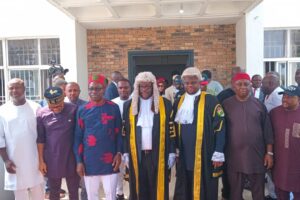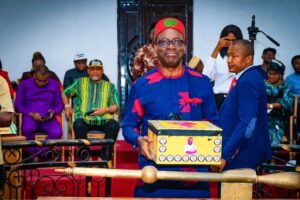Nwajiuba Asks Court To Disqualify Tinubu, Atiku Over ‘vote Buying’
Chukwuemeka Nwajiuba, immediate past minister of state for education, has filed a suit before an Abuja federal high court seeking to void the election of Bola Tinubu as presidential candidate of the All Progressives Congress (APC).
The suit, marked FHC/ABJ/CS/942/2022, filed alongside the Incorporated Trustees of Rights for All International, a non-governmental organisation, is also praying the court to disqualify Atiku Abubakar, candidate of the Peoples Democratic Party (PDP), over breach of the Electoral Act.
Other defendants in the matter are the APC, PDP, the attorney-general of the federation and the Independent National Electoral Commission (INEC).
The plaintiffs, in the suit filed through their lawyer, Okere Nnamdi, alleged that the primary that produced Tinubu as the APC’s 2023 presidential candidate was tainted by corruption and widespread vote buying, insisting that the majority of the delegates were bought over with dollars.
In his proof of evidence attached to the suit, Nwajiuba, who polled only one vote at the primary which held on June 8, attached a video clip showing where Rotimi Amaechi, former transportation minister, complained that delegates at the APC primary sold their votes.
The plaintiffs also queried Tinubu’s source of income and his educational qualifications.
They urged the court to declare that the third defendant (Tinubu), “who had previously sworn an affidavit in the INEC nomination form declaring that he lost his primary and secondary school documents and benefitted therefrom, cannot in a later affidavit deny and abandon same facts deposed in the previous affidavit and thus falsely contradicting his academic qualifications”.
Copies of the affidavits Tinubu signed while running for governor of Lagos state on the platform of the Alliance for Democracy (AD), were supplied by the plaintiffs.
“That the entire circumstances surrounding the two depositions of the 3rd defendant point to the fact that they are false and misleading and cannot be relied upon,” they said.
“That the possession of a higher degree does not substitute the minimum requirement of law, where the minimum academic requirement is manifestly absent by an avowed fact.
“That the possession of a higher education qualification such as a first degree or masters degree is predicated on the minimum educational qualification as provided in the Constitution.”
Among other things, the plaintiffs prayed the court to determine “whether the APC is exempted from compliance with section 90(3) of the Electoral Act 2022, having presented the 3rd defendant (Tinubu) as its presidential candidate to the 6th defendant (INEC), and the 6th defendant accepted and published same, being the name of a person whose source of N100m contribution fee for the nomination form and expression of interest form was not verified”.
The plaintiffs also want the court to determine “whether the constitutional provision prescribing the academic qualification of candidates and prescribing minimum qualification of school certificate or its equivalent has been complied with by the 3rd defendant who, on oath, has admitted that he does not possess such minimum qualification prescribed in the 1999 Constitution of Nigeria”.
For Atiku, the plaintiffs alleged he engaged in vote buying.
They want the court to determine “whether the conduct of the 3rd and 4th defendants (Tinubu and Atiku) and their agents, who by way of corrupt inducement of delegates with US Dollars, which being a foreign currency and non-legal tender in Nigeria under the CBN Act, and the possession which requires declaration under the EFCC Act, used the Dollars for inducement of votes in favour of the 3rd and 4th defendants, have rendered the votes of such delegates cast in favour of the 3rd and 4th defendants at the 1st and 2nd defendant’s special conventions illegal, void and invalid and of no effect whatsoever; and thus inhibiting the 3rd and 4th defendants from benefiting from the proceeds of their own gross illegalities”.
Inyang Ekwo, the presiding judge, on Friday, ordered service of all the relevant court processes as well as hearing notices on all the defendants in the matter.
He also fixed October 6 for hearing of the suit. Continue reading












Add Comment